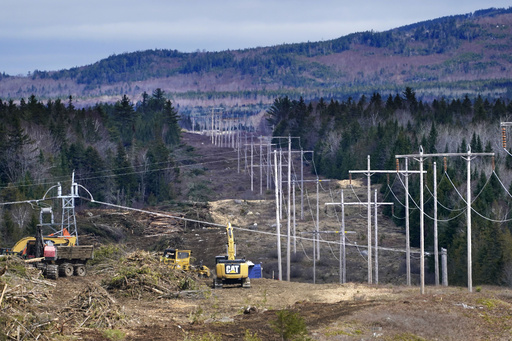
Three utility companies from Massachusetts, along with the parent company of Central Maine Power, have unanimously agreed that ratepayers in Massachusetts are responsible for an additional $512 million due to delays in a significant power transmission project in Maine. This endeavor, designed to facilitate the flow of Canadian hydropower into the New England electricity grid, has faced various challenges along its path.
Proponents of the initiative emphasized during a recent announcement that, despite the setbacks and increased expenses, the project still provides an attractive option for delivering clean energy capable of powering approximately 1 million homes. Massachusetts state Senator Michael Barrett, who serves as co-chair of the Telecommunications, Utilities and Energy Committee, remarked, “Despite the unexpected costs, this clean energy proposition remains favorable. I doubt we will find prices this competitive in the future. It is essential we absorb the additional burden and move forward.”
The total expenditure for the project has surged from an initial estimate of $1 billion to a minimum of $1.5 billion, attributed to inflation and delays instigated by opposition. Consequently, the Massachusetts Legislature authorized the passing on of most of these increased costs to ratepayers late last year. Recently, the Massachusetts Department of Energy Resources and the attorney general’s office became parties to the agreement, which they submitted for approval to the Department of Utilities on Monday.
Supporters advocate for the project, asserting that the planned delivery of 1,200 megawatts of electricity will result in lower electricity costs throughout the region, diminish carbon emissions, and assist Massachusetts in achieving its clean energy objectives. Elizabeth Mahoney, energy resources commissioner, along with Liz Anderson from the attorney general’s office, expressed anticipation for the project, stating, “This transmission line is expected to decrease electricity prices overall and furnish new, reliable power as we transition towards clean energy. We eagerly await the advent of clean hydropower in Massachusetts.”
Documentation submitted to the Massachusetts Department of Public Utilities suggests projected savings of roughly $3.4 billion for Massachusetts ratepayers over a 20-year agreement based on anticipated market prices. The project is a collaborative effort between Avangrid, the parent company of Central Maine Power, and Hydro Quebec from Canada. It involves the construction of a 145-mile (233-kilometer) power transmission line, which largely aligns with pre-existing corridors. However, a new 53-mile (85-kilometer) route had to be forged through wooded areas to access the Canadian border, an action condemned by various environmental and conservation groups.
The project has encountered multiple challenges, managing to secure all necessary regulatory approvals. However, progress was impeded when Maine voters expressed their opposition in a November 2021 referendum. Subsequently, a jury determined that the referendum violated the developers’ vested rights, deeming it unconstitutional.
